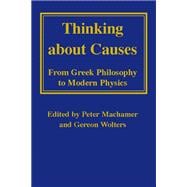
Note: Supplemental materials are not guaranteed with Rental or Used book purchases.
Purchase Benefits
Looking to rent a book? Rent Thinking About Causes [ISBN: 9780822943099] for the semester, quarter, and short term or search our site for other textbooks by Machamer, Peter. Renting a textbook can save you up to 90% from the cost of buying.
| The Concept of Causality in Greek Thought | p. 1 |
| Moral Causes: The Role of Physical Explanation in Ancient Ethics | p. 14 |
| Ancient Stoicism, "Robust Epistemology," and Moral Philosophy | p. 37 |
| Powerless Causes: The Case of Sacramental Causality | p. 47 |
| From Scholasticism to Modern Physics - and Back? The Transformation of Traditional Causal Concepts in Descartes and Occasionalism | p. 77 |
| Kant on Transcendental Laws | p. 100 |
| Freedom from Necessity: The Influence of J. S. Mill's Politics on His Concept of Causation | p. 123 |
| Mill on Causation and the Historical Turn in Philosophy of Science: Some Historical and Methodological Remarks | p. 141 |
| Sprachkritik and the Problem of Historical Understanding: Kant, Dilthey, Wittgenstein, and Weber | p. 154 |
| Plurality in Causality | p. 178 |
| How to Be a Causal Pluralist | p. 200 |
| Do the Causal Principles of Modern Physics Contradict Causal Anti-Fundamentalism? | p. 222 |
| Epiphenomenalism: The Dos and the Don'ts | p. 235 |
| On Selection Of, For, With, and Against | p. 265 |
| Causality in Economics | p. 284 |
| The Core of Free Will | p. 297 |
| Index | p. 311 |
| Table of Contents provided by Blackwell. All Rights Reserved. |
The New copy of this book will include any supplemental materials advertised. Please check the title of the book to determine if it should include any access cards, study guides, lab manuals, CDs, etc.
The Used, Rental and eBook copies of this book are not guaranteed to include any supplemental materials. Typically, only the book itself is included. This is true even if the title states it includes any access cards, study guides, lab manuals, CDs, etc.